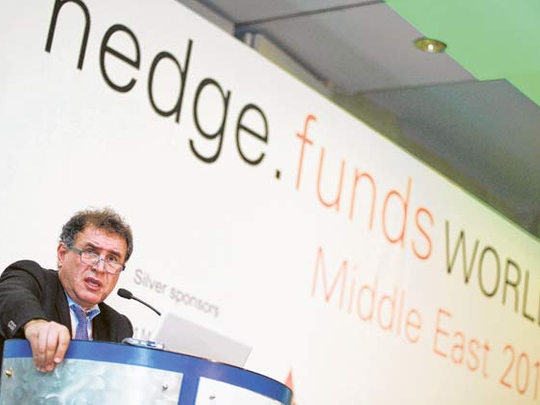
Dubai: The oil price spike caused by the political instability in some Middle East and North African countries could derail the fragile economic recovery in the world, said Nouriel Roubini, the economist who predicted the global financial crisis.
Speaking at the Middle East Investment Summit 2011 in Dubai yesterday, Roubini said the escalation in the political crisis in the region could result in oil prices going above $140 (Dh514.12) which will result in a double dip recession in some advanced economies.
The Organisation of Petroleum Exporting Countries has yet to officially change its production policy, even though it has been boosting supply informally and Saudi Arabia has offered to help make up for the loss of around two thirds of Libya's output.
Kuwait Oil Minister Shaikh Ahmad Al Abdullah Al Sabah told reporters yesterday that Opec is considering an output increase.
"We are in consultations about a potential output increase, but have not yet decided." Brent was down $1.04 at $114.00 a barrel at 13.25 GMT. On February 24 Brent hit $119.79, the highest since July 2008, when it reached a record $147.50.
‘No shortage'
A different message emerged from Iran. Its Opec governor Mohammad Ali Khatibi downplayed speculation of more Opec oil. "There is no shortage in the market," he told Reuters. "There is no need for further Opec supply.
"But the consumers are worried, this is psychological."
Goldman Sachs raised its second quarter 2011 Brent crude oil forecast to $105 a barrel from $100.50 yesterday, saying Opec's spare capacity was being eroded as Saudi Arabia cushioned lost Libyan supplies.
Roubini said that peripheral Europe in particular, and the Eurozone, Japan and the US will be impacted severely.
"A 15 to 20 per cent increase in oil prices could stall the economic growth in the US, Japan and the Eurozone while emerging markets could witness further escalation of inflation and a decline in growth as a result of the surging input costs.
Deleveraging
The US corporate sector has done significant deleveraging over the last two years and most balance sheets are cash rich. According to him oil prices at their current levels probably won't result in any significant slowdown in the advanced economies because they are recovering from a severe recession and still face high unemployment.
Although the oil supply has not been severely impacted by the political turmoil in the Mena region, except the supply from Libya, Roubini said fear and price surge expectations are likely to drive the oil prices up further.
Sounding caution, he said the impact of political instability in the region should not be underestimated. Roubini, an economics professor at New York University, said spikes in energy prices related to wars or conflict in the Middle East preceded three of the last five global recessions.
Roubini, known as Dr. Doom for his pessimistic forecasts, sounded more optimistic about the global recovery, although oil prices remain a key factor.
‘Exceptional strength'
"The risks of outright deflation and a double dip recession are less probable. While the emerging economies are leading the global economic recovery and growth, the developed world including the US and Europe have shown exceptional strength in terms of balance sheet repair and fiscal adjustment," said Roubini.
Although there are many positives in the global economy, he said significant uncertainties remain and they will cause volatility in asset prices for the next three to four years.
"For the next few years, we will be living in a world where these uncertainties may have a negative impact on the economy and financial markets."
Have your say
Do you think the increase in oil prices is because of the unrest in the region? Or is it more to do with speculation and overreaction? Are you concerned about the price increase? How do you think this affects the world economy? Tell us.












